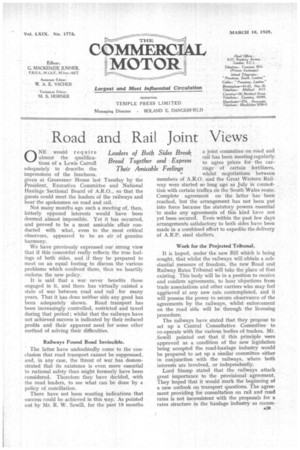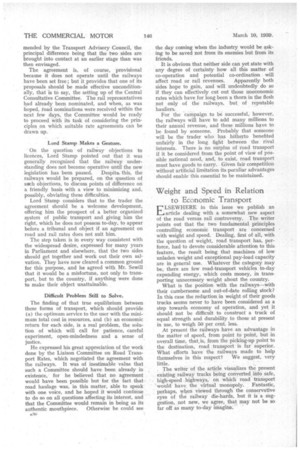Road and Rail Joint Views O NE would require almost the
Page 31

Page 32

If you've noticed an error in this article please click here to report it so we can fix it.
qualifications of a Lewis Carroll adequately to describe the impressions of the luncheon, given at Grosvenor House last Tuesday by the President, Executive Committee and National Haulage Sectional Board of A.R.O., so that the guests could meet the leaders of the railways and hear the spokesmen on road and rail.
Not many months ago such a meeting of, then, bitterly opposed interests would have been deemed almost impossible. Yet it has occurred, and proved to be a most amicable affair conducted with what, observers, appeared harmony.
We have previously expressed our strong view that if this concordat really reflects the true feelings of both sides, and if they be prepared to meet on an equal footing to discuss the various problems which confront them, then we heartily endorse the new policy.
It is said that a war never benefits those engaged in it, and there has virtually existed a state of war between road and rail for many years. That it has done neither side any good has been adequately shown. Road transport has been increasingly controlled, restricted and taxed during that period ; whilst that the railways have not achieved success is indicated by their reduced profits and their apparent need for some other method of solving their difficulties. even to the most critical to be an air of genuine Railways Found Road Invincible.
The latter have undoubtedly come to the conclusion that road transport cannot be suppressed, and, in any case, the threat of war has demonstrated that its existence is even more essential to national safety than might formerly have been considered. Therefore they have decided, with the road leaders, to see what can be done by a policy of conciliation.
There have not been wanting indications that success could be achieved in this way. As pointed out by Mr. R. W. Sewill, for the past 18 months a joint committee on road and railhas been meeting regularly to agree prices for the car Their Amicable Feelings riage of• certain fertilizers, whilst negotiations between members of A.R.O. and the Great Western Railway were started so long ago as July in conneetion with certain traffics oh the South Wales route. Complete agreement on the latter has been reached, but the arrangement has not been put into force because the statutory powers essential to make any agreements of this kind have not yet been secured. Even within the past few days arrangements satisfactory to both sides have been made in a combined effort to expedite the delivery of A.R.P. steel shelters.
Work for the Projected Tribunal.
It is hoped, under the new Bill which is being sought, that whilst the railways will obtain a substantial measure of freedom, the new Road and Railway Rates Tribunal will take the place of that existing. This body will be in a position to receive and confirm agreements, to hear objections from trade associations and other carriers who may feel aggrieved at any new rate contemplated, and it will possess the power to secure observance of the agreements by the railways, whilst enforcement on the road side will be through the licensing procedure. The railways have stated that they propose to set up •a Central Consultative Committee to co-operate with the various bodies of traders. Mr. Sewill pointed out that if this principle were approved as a condition of the new legislation being accepted the road-haulage industry would be prepared to set up a similar committee either in conjunction with the railways, where both interests are involved, or independently.
Lord Stamp stated that the railways attach great importance to the provisional agreement. They hoped that it would mark the beginning of a new outlook on transport questions. The agreement providing for consultation on rail and road rates is not inconsistent with the proposals for a rates structure in the haulage industry as recom mended by the Transport Advisory Council, the principal difference being that the two sides are brought into contact at an earlier stage than was then envisaged.
The agreement is, of course, provisional because it does not operate until the railways have been set free ; but it provides that one of its proposals should be made effective unconditionally, that is to say, the setting up of the Central Consultative Committee. The rail representatives had already been nominated, and when, as was fioped, road nominations were received within the next few days, the Committee would be ready to proceed With its task of considering the principles on which suitable rate agreements can be drawn up.
Lord Stamp Makes a Gesture.
On the question of railway objections to licences, Lord Stamp pointed out that it was generally recognized that the railway understanding does not become operative until the new legislation has been passed. Despite, this, the railways would be prepared, on the question of sach objections, to discuss points of difference on a friendly basis with a view to minimizing and, possibly, obviating these difficulties.
Lord Stamp considers that to the trader the agreement should be a welcome development, offering him the prospect of a better organized system of public transport and giving him the right, which he does not possess to-day, to appear before a tribunal and object if an agreement on road and rail rates does not suit him.
The step taken is in every way consistent with the widespread desire, expressed for many years in Parliament and elsewhere, that the two sides should get together and work out their own salvation. They have now cleared a common ground for this purpose, and he agreed with Mr. Sewill that it would be a misfortune, not only to transport, but to the country, if anything were done to make their object unattainable.
Difficult Problem Still to Solve.
The finding of that true equilibrium between these forms of transport, which should provide (a) the optimum service to the user with the minimum total cost in resources, and (b) an economic return for each side, is a real problem, the solution of which will call for patience, careful experiment, open-mindedness and a sense of justice.
He expressed his great appreciation of the work done by the Liaison Committee on Road Transport Rates, which negotiated the agreement with the railways. It was of inestimable value that such a Committee should have been already in existence, for he believed that no agreement would have been possible but for the fact that road haulage was, in this matter, able to speak with one voice, and he hoped it would continue to do so on all questions affecting its interest, and that the Committee would remain in being as its authentic mouthpiece. Otherwise he could see the day coming when the industry would be asking to be saved not from its enemies but from its friends.
It is obvious that neither side can yet state with any degree of certainty how all this matter of co-operation and potential co-ordination will affect road or rail revenues. Apparently both sides hope to gain, and will undoubtedly do so if they can effectively cut out those uneconomic rates which have for long been a thorn in the flesh not only of the railways, but of reputable hauliers.
For the 'campaign to be successful, however, the railways will have to add many millions to their annual revenue, and these millions have to be found by someone. Probably that someone will be the trader who has hitherto benefited unfairly in the long fight between the rival interests. There is no surplus of road transport if it be considered from the point of view of possible national need, and, to exist, road transport must have goods to carry. Given fair competition without artificial limitation its peculiar advantages should enable this essential to be maintained.
Weight and Speed in Relation to Economic Transport
LSE WHERE in this issue we publish an I article dealing with a somewhat new aspect of the road versus rail controversy. The writer points out that the two fundamental principles controlling economic transport are concerned with weight and speed. Dealing, first of all, with the question of weight, road transport has, perforce, had to devote considerable attention to this feature, the result being that machines of low unladen weight and exceptional pay-load capacity are in general use. Whatever the category may be, there are few road-transport vehicles to-day expending energy, which costs money, in transporting unnecessary weight about the country.
What is the position with the railways—with their cumbersome and out-of-date rolling stock? In this case the reduction in weight of their goods trucks seems never to have been considered as a step towards economy of operation, and yet it should not be difficult to construct a truck of equal strength and durability to those at present in use, to weigh 50 per cent. less.
At present the railways have an advantage in the matter of speed, from point to point, but in overall time, that, is, from the picking-up point to the destination, road transport is far superior. What efforts have the railways made to help themselves in this respect? We suggest, very little.
. The writer of the article visualizes the present existing railway tracks being converted into safe, high-speed highways, on which road transport would have the virtual monopoly. Fantastic,• perhaps, when viewed through the conservative eyes of the railway die-hards, but it is a suggestion, not new, we agree, that may not be so far off as many to-day imagine.




























































































